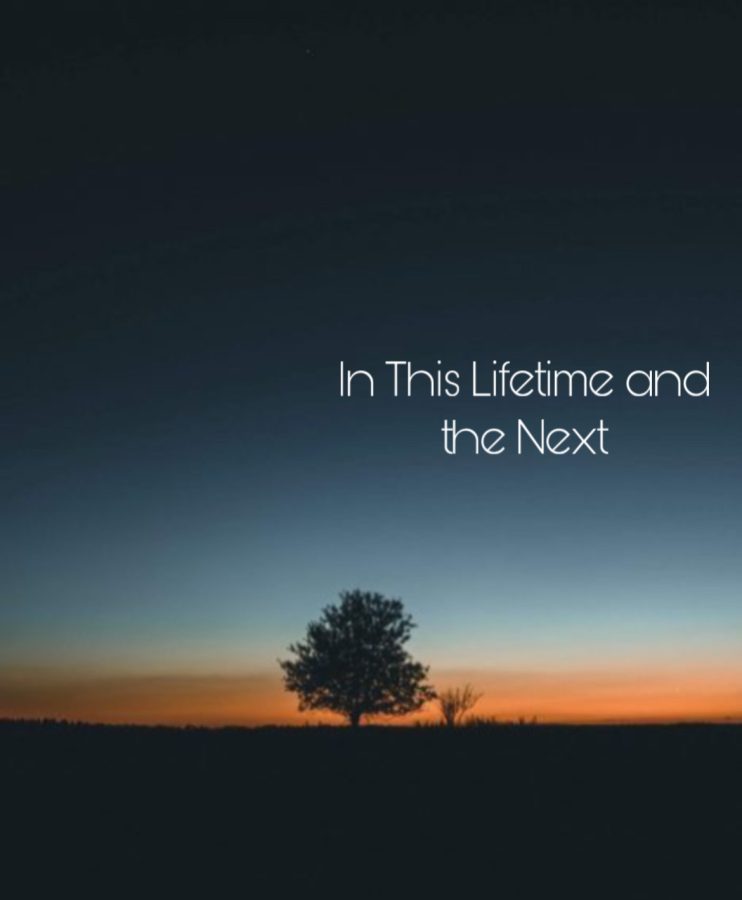Grief, In this lifetime and the Next
January 14, 2022
Have you ever lost someone you loved?
If you have, then you have experienced the pain, the denial, the sadness, the anger, and the guilt that comes in waves before settling into a feeling of nothing at all, just pure blankness. Experiencing loss means realizing that you can’t just pick up the phone and call them; you can’t reach out and ask them if this is all a misunderstanding, a mistake.
These intense feelings exist because this person you held so close to you is gone and they’re never coming back. It’s difficult to handle because one often blames themselves as they wonder if maybe there was something they could’ve done or they punish themselves because they realize that they didn’t cherish them enough. Those who lose others do this because there has to be something or someone to blame it on. .
The truth is, there is something to blame: grief. I know this grief as I have suffered major loss in my life losing my grandmother, my uncle, and most recently my father.
When a loved one dies they are replaced by grief. Grief is defined as “deep sorrow, especially brought on by someone’s death,” and it can be all consuming for a person. One thing that makes it complicated is that grief does not come alone, it brings its five stages: denial, anger, bargaining, depression, and acceptance. Even more adding on to that is how grief takes form in teens and adolescents leading to an increase in things like worsened mental health, increased aggression, and an increased risk in self-harm.
Denial. The last-minute attempt to pretend that the loss does not exist is what defines denial. According to Cruse Bereavement Support, a UK group dedicated to helping people through grief, denial can be described as “Feeling numb is common in the early days after a bereavement. Some people at first carry on as if nothing has happened.” When I lost my dad, grief struck me hard. I learned about his passing the morning after he died, though I’d say it hadn’t fully registered until his funeral events started. The days after his passing, family and friends poured in as did the constant message, “I’m so sorry.” I heard this phrase repeated daily. But it just couldn’t fully register with me what they were sorry for. I wondered, “Should I be sorry too?”
Anger. After denial, you are faced with the pain of your loss. Anger is often the first emotion one feels when they deal with loss. Very Well Mind, an organization dedicated to prioritizing mental health and offering information on mental health topics, published an article by Jodi Clarke, a licensed professional counselor, who details how along with anger comes an overwhelming feeling of isolation; feeling trapped. I felt anger at my dad at first for choosing to have a surgery without, I felt, considering all the risk factors associated with something as serious as a double lung transplant. I know he had been sick for many years – literally all of my life – due to the pneumonia he had many years ago that completely ravaged both of his lungs. But it felt like he just jumped at the opportunity to do the surgery without thinking it through. The truth, though, was that behind that anger was really just the pain that he was gone, that he had, in a way, abandoned me.
Bargaining. Your defense plan against the emotions of grief arises next. You feel so desperate that you’re looking for any lifeline to minimize the pain, to feel like you have some sort of control over what you are experiencing. Bargaining means fighting off or at least trying to buy some time against the flood of sadness, confusion, and hurt. I stared at my dad’s office door everyday in the weeks following his death. I did this even in the weeks before when he was in the hospital. Waiting for that office light to come on, waiting for the music to start blasting, eyeing the vacant couch he sat in religiously every day after work. All of this to try and convince myself that one day he’d just walk in and life would be as it was, nothing would be missing. But I have yet to see that day.
Depression. The time comes when your imagination of different scenarios that would help to self-soothe ceases. You start to feel the unavoidable loss which waits for you every morning when you wake up and puts you to sleep every night. Reality pours in. After the tributes had been written and printed, the tombstone customized, and the death certificate ink dry, the realization that he was not going to come home hit hard. He wasn’t going to fill the printer with new ink, complain about my siblings, and I listen to me making him order us pizza. Dad had left us alone and that was all.
Acceptance. This is the part in your grief where you are no longer in a fight with reality for a different outcome, for a different reality. You’re no longer trying to make the situation different than it is. Honestly, I can’t say that I know much about this stage, and am not filled to the brim with knowledge about how my dad is gone– that it just is what it is. I wake up everyday and I do what I have to do: I laugh, I smile, I do my silly little makeup, and I play my silly little games. We visit his grave on holidays and his birthday, leave flowers and say our pieces. Yet, I just haven’t seen and can’t foresee a day where I don’t have another piece to say, another question to ask, a theory to present, a tear to shed–-not only his death but, also for him. We can add acceptance to one of the stages of grief but it will never be just that simple.
Loss is a collaborative art between those who leave us and those who remain. We dance with the shadows of their absence and carry on the best we know how.
If you or someone you know has lost someone and needs support, the Grief Hotline can be reached at: (800) 395-5755.












































